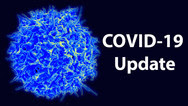

Immune T Cells May Offer Lasting Protection Against COVID-19
Posted on by Dr. Francis Collins

Much of the study on the immune response to SARS-CoV-2, the novel coronavirus that causes COVID-19, has focused on the production of antibodies. But, in fact, immune cells known as memory T cells also play an important role in the ability of our immune systems to protect us against many viral infections, including—it now appears—COVID-19.
An intriguing new study of these memory T cells suggests they might protect some people newly infected with SARS-CoV-2 by remembering past encounters with other human coronaviruses. This might potentially explain why some people seem to fend off the virus and may be less susceptible to becoming severely ill with COVID-19.
The findings, reported in the journal Nature, come from the lab of Antonio Bertoletti at the Duke-NUS Medical School in Singapore [1]. Bertoletti is an expert in viral infections, particularly hepatitis B. But, like so many researchers around the world, his team has shifted their focus recently to help fight the COVID-19 pandemic.
Bertoletti’s team recognized that many factors could help to explain how a single virus can cause respiratory, circulatory, and other symptoms that vary widely in their nature and severity—as we’ve witnessed in this pandemic. One of those potential factors is prior immunity to other, closely related viruses.
SARS-CoV-2 belongs to a large family of coronaviruses, six of which were previously known to infect humans. Four of them are responsible for the common cold. The other two are more dangerous: SARS-CoV-1, the virus responsible for the outbreak of Severe Acute Respiratory Syndrome (SARS), which ended in 2004; and MERS-CoV, the virus that causes Middle East Respiratory Syndrome (MERS), first identified in Saudi Arabia in 2012.
All six previously known coronaviruses spark production of both antibodies and memory T cells. In addition, studies of immunity to SARS-CoV-1 have shown that T cells stick around for many years longer than acquired antibodies. So, Bertoletti’s team set out to gain a better understanding of T cell immunity against the novel coronavirus.
The researchers gathered blood samples from 36 people who’d recently recovered from mild to severe COVID-19. They focused their attention on T cells (including CD4 helper and CD8 cytotoxic, both of which can function as memory T cells). They identified T cells that respond to the SARS-CoV-2 nucleocapsid, which is a structural protein inside the virus. They also detected T cell responses to two non-structural proteins that SARS-CoV-2 needs to make additional copies of its genome and spread. The team found that all those recently recovered from COVID-19 produced T cells that recognize multiple parts of SARS-CoV-2.
Next, they looked at blood samples from 23 people who’d survived SARS. Their studies showed that those individuals still had lasting memory T cells today, 17 years after the outbreak. Those memory T cells, acquired in response to SARS-CoV-1, also recognized parts of SARS-CoV-2.
Finally, Bertoletti’s team looked for such T cells in blood samples from 37 healthy individuals with no history of either COVID-19 or SARS. To their surprise, more than half had T cells that recognize one or more of the SARS-CoV-2 proteins under study here. It’s still not clear if this acquired immunity stems from previous infection with coronaviruses that cause the common cold or perhaps from exposure to other as-yet unknown coronaviruses.
What’s clear from this study is our past experiences with coronavirus infections may have something important to tell us about COVID-19. Bertoletti’s team and others are pursuing this intriguing lead to see where it will lead—not only in explaining our varied responses to the virus, but also in designing new treatments and optimized vaccines.
Reference:
[1] SARS-CoV-2-specific T cell immunity in cases of COVID-19 and SARS, and uninfected controls . Le Bert N, Tan AT, Kunasegaran K, et al. Nature. 2020 July 15. [published online ahead of print]
Links:
Coronavirus (COVID-19) (NIH)
Overview of the Immune System (National Institute of Allergy and Infectious Diseases/NIAID)
Bertoletti Lab (Duke-NUS Medical School, Singapore)





















.png)












No hay comentarios:
Publicar un comentario